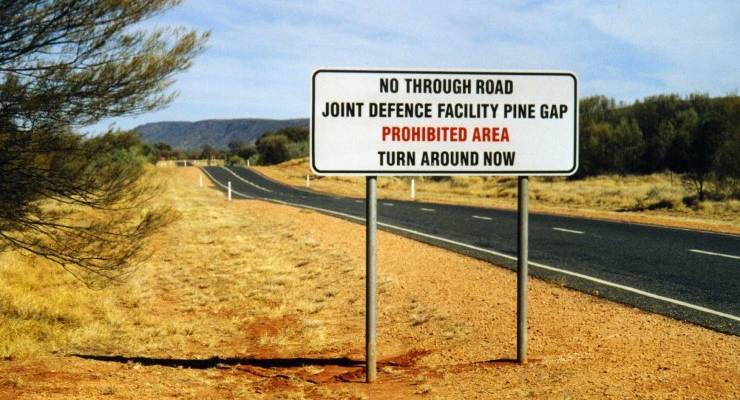
“The biggest secret about Pine Gap,” writes Brian Toohey in his new book Secret: The Making of Australia’s Security State, “is that it is essentially irrelevant to verifying compliance with arms control agreements.”
Toohey, perhaps Australia’s most distinguished national security journalist, shows Pine Gap’s true purpose — to serve American war-fighting machinery — and how Australia’s political class turns a blind eye to this, willingly or otherwise.
The claim that Pine Gap contributes to peace by enabling verification of strategic arms control agreements was made in the ’80s when, Toohey says, “Australian opposition to Pine Gap … was much stronger than it is today”. It was essentially a ruse by the Hawke government to contain public opposition to president Ronald Reagan’s “Star Wars” initiative, which would have undermined the 1972 Anti-Ballistic Missile Treaty.
Toohey points out that arms control agreements push for cuts to missile and warhead — the total number of which “is the central figure for arms control”. These are verified by photographic images from low-orbiting satellites. Pine Gap contributes “next to nothing” because its satellites “only provide information about … particular [missiles] tested”. Instead, the facility acquires information from US satellites detecting heat from aircraft, artillery, missiles, drones and space vehicles, as well as military and civilian communications. The data is processed into usable intelligence and employed against those whom the US considers hostile.
Toohey also demonstrates that Australia has allowed its territory to serve as a site for US space surveillance radar and an advanced space surveillance telescope. Their principal task is to enable the US to detect and destroy Chinese and Russian satellites — “incompatible with Australia’s ratification of the 1967 Outer Space Treaty preventing the militarisation of space,” Toohey writes. Unfortunately, Australian ministers appear keen to obscure their compliance from voters — and sometimes their own parties.
Thanks to diplomatic cables released by WikiLeaks in 2010, we know the then-Labor government secretly cooperated with the US on missile defence in 2009. Michael Pezzullo, then-deputy secretary of defence, assured the US embassy that a 2009 Defence White Paper had been carefully crafted to appeal to Labor’s left, “but in reality will allow the government of Australia to continue its missile defence research and development cooperation with the United States”. Pezzullo said there would be “a storm at the party’s annual national conference” if the Labor Left “perceives it has been deceived”.
And the obfuscation goes further. Although Pine Gap is on Australian territory, the Parliamentary Joint Committee on Intelligence and Security and the Joint Standing Committee on Foreign Affairs, Defence and Trade do not consider its operations. These committees’ security-cleared staff are not given classified briefings about Pine Gap. Meanwhile, visiting US congressional committee staff are.
Australia’s political class — both politicians and journalists — accepts this state of affairs submissively. But Toohey has an entirely different attitude. He was part of a new generation of journalists who published significant intelligence leaks starting in 1972, the last days of the McMahon government. The previous generation had the memory of austerity hanging over them as a spur to their conformist, authoritarian attitudes. They accepted the secrecy surrounding British nuclear proliferation (the polite word is “tests”) despite the damage to the Australian public. Toohey’s generation paused, examined the arguments for government secrecy, and rejected them.
They saw no need to genuflect before “top secret” stamps and alarmist claims. Rather, they asked what the actual harm to Australians would be. Journalists under 55 have grown up in a different cultural and economic environment. They’re more respectful towards authority figures.
Toohey shows us how to use rationality, contempt and ridicule in a book that should be read and discussed widely.
Professor Clinton Fernandes holds dual appointments at the School of Humanities and Social Sciences and the Australian Centre for Cyber Security, UNSW Canberra. He is a former Australian Army officer who served in the Australian Intelligence Corps. He is the author of Island off the Coast of Asia.








Great op ed and timely. The criticism of compliant governments and today’s journos is well placed. Brian Toohey is a class act. Professor Clinton’s CV gives authority to the concerns raised. Not to worry, the usual suspects are still in the driving seat so it’s all good.
We allowed the US in & there’s no way to be rid of them now. Ditto the marine base near Darwin. Dumb decisions made purely to curry favour.
…. meanwhile we’re all in a tizz about Glad Liu and little Sammy D before that. Back in the day Pine Gap was rightly called as our main nuclear target.
if anyone believes in progress in human affairs, rather than two steps forward, three steps back, the author’s opinion that “Journalists under 55 have grown up in a different cultural and economic environment. They’re more respectful towards authority figures” is salutary.
If that isn’t regression – of ethics,morality, probity or just plain IQ – I don’t know what is.
When the Tooheys of this world are gone, not only do I see no prospect of the current crop of churnalists & stenographers filling their brogues.
To paraphrase the 70s – “bliss it was in that Dawn of Democracy to be alive but to be young was very Heaven”.
Who would want to be young now with the impending Crapocalypse?
It is sad and scary that today’s youth have hitched their wagons to climate change and gender fluidity. In fact, the ruling elite is sort of relieved that those 2 battlegrounds are front and centre, because Australia’s subservience to the US is glossed over. While politicians can threaten whistleblowers and raid the homes of journos, Pine Gap and others will remain invisible.